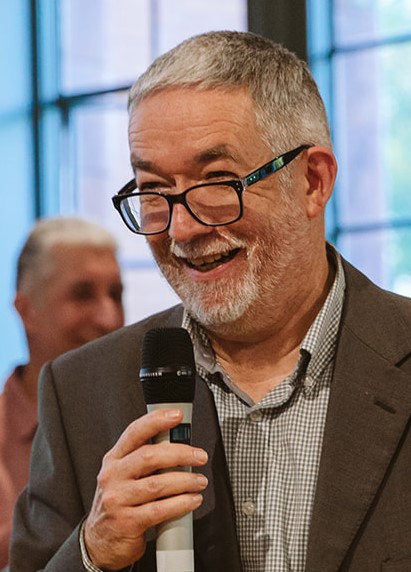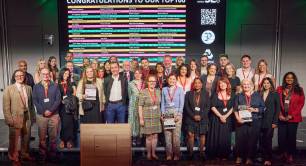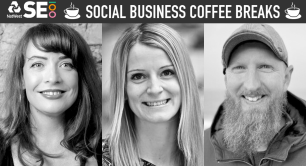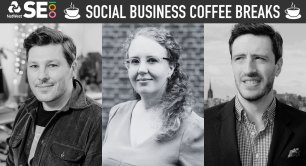How to reduce your carbon footprint: Don’t delay for the sake of perfection, make the business case and ban those stereotypical polar bear images
How can you motivate and equip your team to reduce carbon emissions and what are the barriers to getting started? Our webinar answers these questions and more.
Images of polar bears have been banned from the Carbon Literacy Project. Despite the obvious symbolism of the iconic animals struggling to find the ice they need to live on, there’s no place for them at the social enterprise which offers bespoke carbon literacy training across the world.
Phil Korbel, co-founder and director of external relations at the Carbon Literacy Project, made the decision because he wanted to ensure the organisation presented the climate crisis in a way that was directly relevant to the people it was training, not like “a nature documentary on the other side of the planet”.

Korbel (pictured) was speaking during the most recent SE100 Social Business Coffee Breaks webinar, on how to be brilliant at reducing your carbon footprint, hosted by Pioneers Post founding editor Tim West. The Social Business coffee breaks webinars, organised in partnership with NatWest Social and Community Capital, aim to provide inspiration and practical advice to help social businesses to grow and thrive.
How to get started with carbon literacy
The Carbon Literacy Project provides training for private, public and third sector organisations, communities, schools and universities with carbon literacy courses to equip them with the knowledge and skills to increase their awareness of their carbon usage and the ability and motivation to reduce CO2 emissions.
In July 2024, the Carbon Literacy Project was named as the winner of our SE100 2024 Climate Pioneers Award, recognising pioneering organisations leading by example and inspiring others to work against climate change and towards a greener, more resilient future. The award judges praised the organisation’s training programme, its measurement of impact and its understanding of the equality issues underlying the fight against climate change.
During the webinar Korbel outlined the organisation’s vision for carbon literacy – that everyone in any given organisation should be thinking about reducing its carbon footprint, in the same way that people considered health and safety, data protection and diversity and inclusion.
While the Carbon Literacy Project offered bespoke training, Korbel explained that everyone had to start by measuring their current carbon footprint – until you’ve done that, you can’t begin to improve.
But he added that while organisations were working out how to measure their footprint, there would be low-hanging fruit they could address to reduce emissions while building up expertise. He said: “Don’t delay action for the sake of having the perfect strategy.”
For members of staff at social enterprises trying to advocate for increasing organisational carbon literacy, Korbel suggested focusing on making the business case for reducing your carbon footprint. He highlighted that he regularly worked with organisations which had a regulatory duty to report on their carbon emissions, and SMEs where a key customer had asked for a carbon footprint assessment, using jargon they didn’t understand.
He said: “This is about bringing home the impacts of climate change to us and the benefits of acting on climate change, and we often end up talking about the co-benefits of those actions. So yes, you’ll lower your overheads. You’ll be responding to customer, public and regulatory demand.”
Who within an organisation should be responsible for reducing carbon footprints would differ from organisation to organisation, said Korbel. He shared the examples of Transport for London training 4,000 members of management staff, because tube drivers didn’t have much agency over their carbon emissions, in comparison with a big retailer which dropped a role of ‘store climate champions’ because everything was being left to those specific people, whereas the entire staff team could take responsibility.
How can a small social enterprise reduce its carbon footprint?

Korbel was joined on the webinar by Steve Templeman (pictured) from Glasgow Vintage Vehicle Trust, a social enterprise which restores and preserves historic vehicles and supports people recovering from addiction through its volunteering programme.
In 2020 the organisation used social investment to buy a former city council bus depot, which it had leased since 2003, as a permanent base for the organisation and store for the 150 buses, coaches, commercial vehicles and fire engines in its collection.
Between old diesel engines and heating a large building, maintaining 150 vintage vehicles and running a former bus depot creates a significant carbon footprint. But Templeman said he was confident the organisation’s volunteers’ pro-active attitude helped them identify the ‘low-hanging fruit’ highlighted by Korbel. For example, the volunteers were very focussed on reusing materials and old parts to help preserve vehicles and reduce waste, explained Templeman.
He said: “I’ve witnessed incredible things that [the volunteers] have been able to do with some of the materials that we just have, either on site or from other vehicles, as opposed to having to continually buy in new products. So we’ve definitely got an upcycling and recycling vibe going on.”
To reduce the carbon footprint of the site, Templeman said the Glasgow Vintage Vehicle Trust was changing all the electrical systems for more energy efficient ones, decommissioning the old oil heating systems and looking into being more sustainable with waste by reducing how much they throw away and recycling wherever possible.
By reducing the carbon footprint of the site, Templeman hoped the organisation could offset some of the emissions of the vehicles it existed to maintain. He said: “When it comes to the preservation of vintage vehicles, obviously you can’t just take out the engine and stick a battery in and off you go. Part of the huge appeal, to many people, is the noises and the smells and the sounds of these things. But it doesn't mean to say that we can't make a huge impact elsewhere within our organisation.”
The only way we’re doomed is if we give up hope
Korbel concluded the webinar by emphasising that every gram of greenhouse gas we kept out of the atmosphere reduced the chance of harm, and that harm was often to the most vulnerable people. He countered perceived ‘climate doomerism’ – people who say there is no point in trying to reduce your carbon footprint because the climate is already beyond saving – which he believed was doing the job of the fossil fuel industry.
He said: “Even if we tip into a period of a less stable climate, the less greenhouse gas out there means we recover more quickly. So there’s no downside to minimising your footprint. We have to do this.”
Korbel shared a thought he attributed to American writer Rebecca Solnit: “Hope is an act of resistance. The only way we're doomed is if we give up hope.”
|
|






